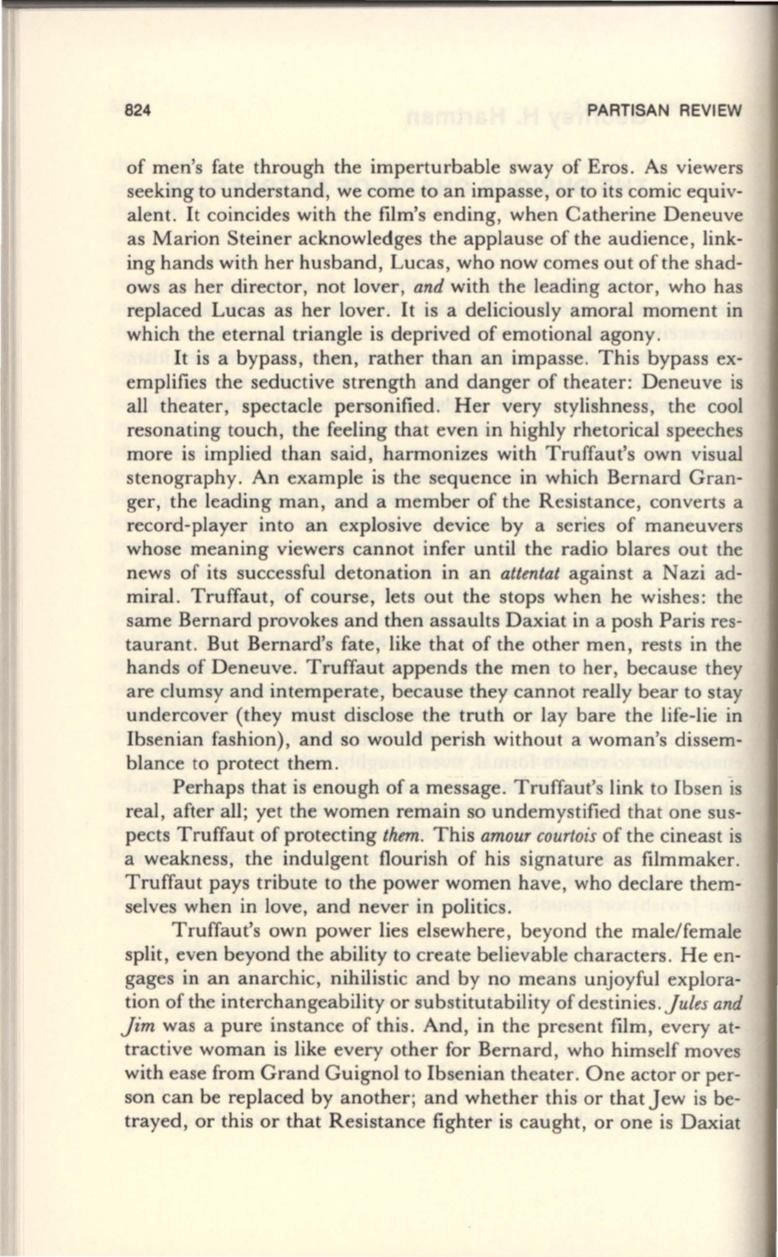
824
PARTISAN REVIEW
of men's fate through the imperturbable sway of Eros. As viewers
seeking to understand, we come to an impasse, or to its comic equiv–
alent. It coincides with the film's ending, when Catherine Deneuve
as Marion Steiner acknowledges the applause of the audience, link–
ing hands with her husband, Lucas, who now comes out of the shad–
ows as her director, not lover,
and
with the leading actor, who has
replaced Lucas as her lover.
It
is a deliciously amoral moment in
which the eternal triangle is deprived of emotional agony.
It is a bypass, then, rather than an impasse. This bypass ex–
emplifies the seductive strength and danger of theater: Deneuve is
all theater, spectacle personified. Her very stylishness, the cool
resonating touch, the feeling that even in highly rhetorical speeches
more is implied than said, harmonizes with Truffaut's own visual
stenography. An example is the sequence in which Bernard Gran–
ger, the leading man, and a member of the Resistance, converts a
record-player into an explosive device by a series of maneuvers
whose meaning viewers cannot infer until the radio blares out the
news of its successful detonation in an
attentat
against a Nazi ad–
miral. Truffaut, of course, lets out the stops when he wishes: the
same Bernard provokes and then assaults Daxiat in a posh Paris res–
taurant. But Bernard's fate, like that of the other men, rests in the
hands of Deneuve. Truffaut appends the men to her, because they
are clumsy and intemperate, because they cannot really bear to stay
undercover (they must disclose the truth or lay bare the life-lie in
Ibsenian fashion), and so would perish without a woman's dissem–
blance to protect them.
Perhaps that is enough of a message. Truffaut's link to Ibsen 1s
real, after all; yet the women remain so undemystified that one sus–
pects Truffaut of protecting
them.
This
amour courtois
of the cineast is
a weakness, the indulgent flourish of his signature as filmmaker .
Truffaut pays tribute to the power women have, who declare them–
selves when in love, and never in politics.
Truffaut's own power lies elsewhere, beyond the male/female
split, even beyond the ability to create believable characters. He en–
gages in an anarchic, nihilistic and by no means unjoyful explora–
tion of the interchangeability or substitutability of destinies.
jules and
jim
was a pure instance of this. And, in the present film, every at–
tractive woman is like every other for Bernard, who himself moves
with ease from Grand Guignol to Ibsenian theater. One actor or per–
son can be replaced by another; and whether this or that Jew is be–
trayed, or this or that Resistance fighter is caught, or one is Daxiat


